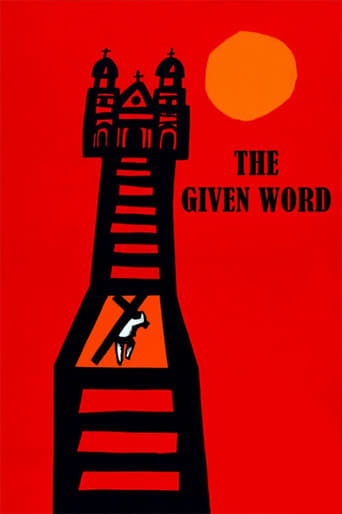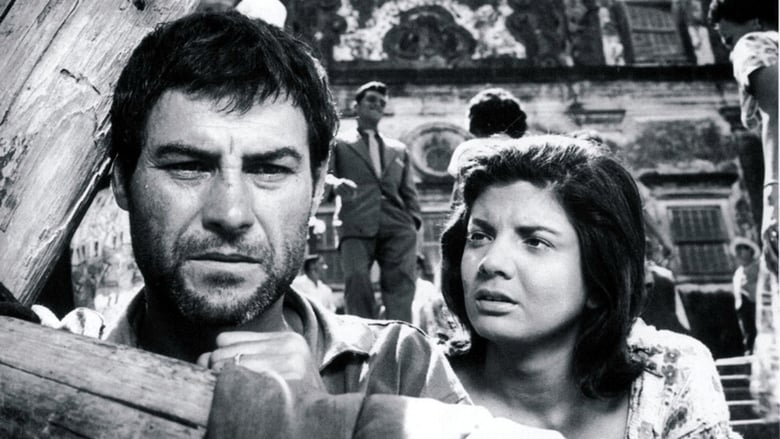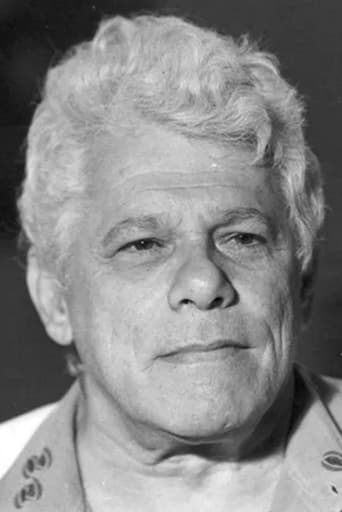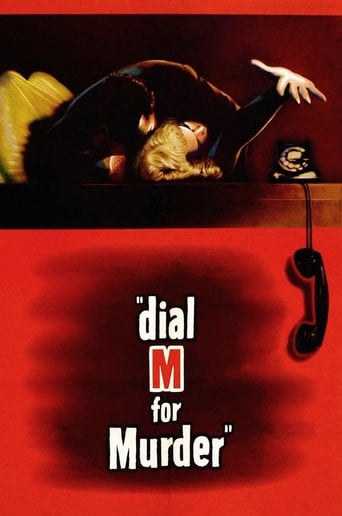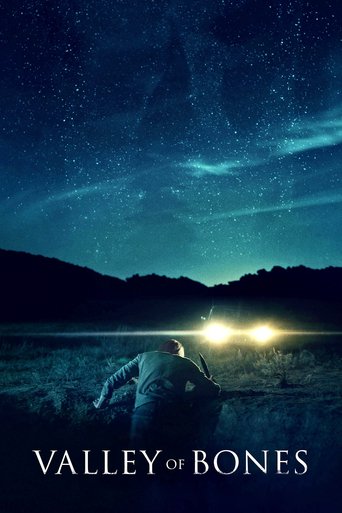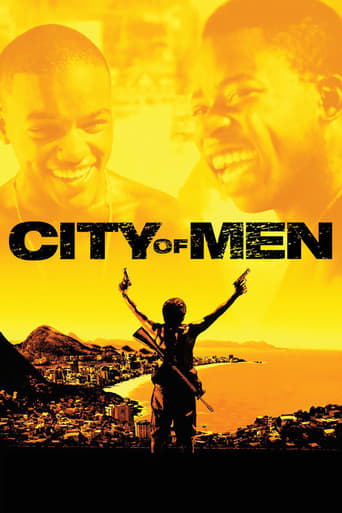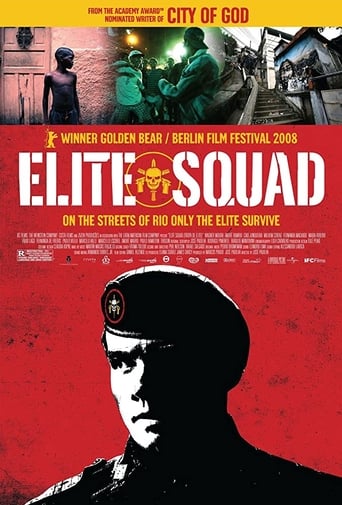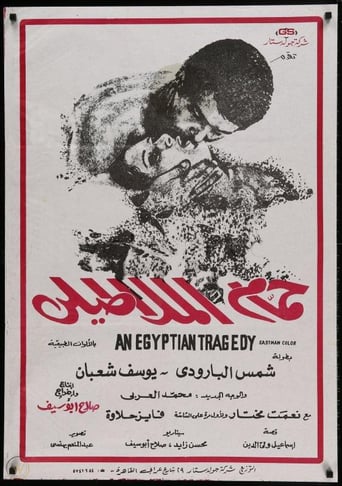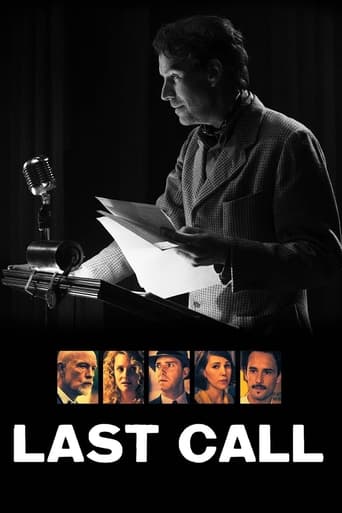The Given Word (1962)
Zé is a very poor man whose most prized possession is his donkey. When his donkey falls terminally ill, Zé makes a promise to Saint Bárbara: If his donkey recovers, he will carry a cross - like Jesus - all the way from his city to Saint Bárbara's church, in the state capital. Upon the recovery of his donkey, Zé leaves on his journey. He makes it to the church, but the priest refuses to accept the cross once he discovers the context of Zé's promise.
Watch Trailer
Free Trial Channels
Cast


Similar titles
Reviews
The biggest problem with this movie is it’s a little better than you think it might be, which somehow makes it worse. As in, it takes itself a bit too seriously, which makes most of the movie feel kind of dull.
Mostly, the movie is committed to the value of a good time.
The movie's not perfect, but it sticks the landing of its message. It was engaging - thrilling at times - and I personally thought it was a great time.
The movie really just wants to entertain people.
A shame such an important movie has no poster here on IMDb. I wanted to add the one that is used on Wikipedia, but I would have to pay to do that. Strange.Anyway, if you are critical of religion fanaticism, then you must see this movie! It shows what can become of fanatic people, how lack of education plays an important role in it, the arrogance of the church and the hypocrisy of our society.Zé do Burro (Joe of the Donkey) has a soul of a child. He is a good guy, but extremely naive at the same time. His naivety is shamelessly exploited and people cruelly distort his good intentions, making an evil person out of him, when all he wanted was to do good.The movie won the Golden Palm in Cannes and other prizes. It's a classic. Dialogs are a bit theatrical (only if you understand Portuguese), but so they used to be that time. A movie that will get under your skin.
This Brazilian religious satirical drama emerged the surprise "Palme D'Or" winner at the Cannes Film Festival over such heavyweight contenders as ADVISE AND CONSENT, DIVORCE – Italian STYLE, THE GODDESS, L'ECLISSE, THE INNOCENTS, MONDO CANE, THE TRIAL OF JOAN OF ARC and THE EXTERMINATING ANGEL! As can be seen from that list, there were a number of other acerbic and/or spiritually-themed movies, which makes its selection for the Grand Prize all the more amazing and remarkable (but, in the long run, certainly not unjust)!; it was also up for the Best Foreign-Language Film Oscar but lost out to the equally heart-felt SUNDAYS AND CYBELE. In hindsight, this is undoubtedly one of the unsung masterpieces of World Cinema which, in spite of the acclaim which clearly met its original release, has fallen through the cracks over the years: I, for one, was unfamiliar with both film and director (even if a number of vintage Brazilian efforts occasionally crop up on late-night Italian TV).Anyway, the film begins with a man carrying a life-size cross across country (often battling the elements) with his wife in tow; I expected the story to unfold in flashback so that we come to learn why he was doing his – but, actually, we follow his often incredible vicissitudes once he reaches his destination. In fact, he had promised Saint Barbara to make this sacrifice (which invariably leaves him bruised, exhausted and eventually hungry) if she healed his wounded and extremely devoted donkey – amusingly, it takes some time before we actually realize he is doing all this for the sake of an animal! What starts out as a harmless eccentricity is soon turned into a circus a' la Billy Wilder's ACE IN THE HOLE (1951) and leads, inevitably to tragedy. First off, the couple arrive in the middle of the night so that they find the church closed. Soon, they are approached by a man who, being a pimp (seen beating up his 'lover' for the miserly night's takings!), we know he is up to no good and that his offer of a helping hand can only have selfish ends (specifically his intentions over the newly-arrived, attractive-looking and obviously gullible woman); indeed, he persuades her to spend the night at a hotel nearby, while her husband sleeps off his fatigue on the damp church-steps! The next morning, people gather for mass but the man is still resting there; the parish priest is naturally curious of his presence and interrogates him as soon as he wakes up. However, the latter proves an unswerving obstacle to the fulfillment of the all-important promise once the poor and naïve outsider mentions the word "candomble'" (a form of local witchcraft)!; incidentally, the film is preceded by a prologue in French explaining this phenomenon (which, it is said, was often deceptively performed in the name of official saints of the Catholic Church!). Still, the man is so honest that he is adamant in accomplishing his task – also because he fears that, if he does not, and simply goes back home his donkey will have a relapse (by the way, the animal is mentioned so often throughout that one wishes we had been able to see it, even if only in a photo or something though, of course, I understand that it was merely used here as a symbol)!Gradually, all kinds of people begin to converge upon the scene: notably a bar-keeper across the street who relishes the consequent influx of 'traffic' in his establishment, a couple of photo-journalists who arrive to conduct an interview and take pictures (only to blow the incident so out of proportion as to land the hierarchy of the Church and, eventually, the Police onto them!), a sneaky poet peddling his gift for verse on the street for his own political ends, an obese black lady into the propagation of Paganism who constantly invites (tempts?) our involuntary martyr-hero to offer his cross at the altar of her false god and, of course, the pimp still after the girl (whose presence his own 'fount of income' will not take sitting down and, sure enough, the two women are soon at each other's throat in full view of the crowd, ever-ready to lap up an out-of-the-ordinary occurrence!). Another fault the priest finds in our protagonist is that, by opting to carry a cross, he has put himself up to the level of Christ – which the journalists are all-too-ready to exploit and, lo and behold, he is being played up as a crusader for the common people, asked rhetorical questions about Mankind's future and even expected to perform miracles on infirm locals! As is the Brazilian trademark, the church-steps eventually become the venue for ritualistic folk dancing but, with the appearance of the Police (brought in by the pimp when he realizes the woman has slipped from his grasp – incidentally, her husband tolerates the affair for the time being but warns her she will have to answer for her conduct on their way back!), the situation soon gets out-of-hand, escalates into a riot, pistol-shots are fired, and our hero drops dead on the spot! When they see this, the locals take it upon themselves to have him keep his word regardless: they tie him to the cross and, using it as a battering ram (which he had earlier attempted himself in desperation), manage to get them inside the church. As the crowds follow or else disperse, the man's wife is left all alone...Strikingly made and persuasively acted, THE GIVEN WORD is really one of the most potent religious parables ever...and I cannot help wondering whether Bresson and Bunuel – two of my favorite film-makers and among cinema's greatest purveyors of Spirituality – had the opportunity to watch it back then and, if so, what their opinions may have been like (perchance the former was inspired by this for his own Christian allegory built around a suffering donkey i.e. BALTHASAR {1966}!!).
Others already mentioned that the film's production values are low - and that's true. But the story of Nicolau (not credited - but it's the donkey's name) and Jack, his owner has more to it than you may think. At first, it's like a comedy about a credulous man who likes his donkey to the point of promising an incredible masochist thing to his God, if the donkey survives an illness. Than, as Jack fulfills his promise, and he gets to look so much like the historical figure of Jesus Christ, trouble erupts. Conservative priests and social-minded, exploitative newspapermen fight over a donkey and a cross, and the problem turns out as a satirical approach to the 1960s socialist class-struggle in Latin America. The story is set in Brazil, but it could be elsewhere at the epoch, though you have plenty of folk music and some dancing that are absolutely a Brazilean trademark. Not to be missed, even if the copy is slightly chopped off by the 1962 military censorship in Brazil.
It is not a surprise that this movie won the golden palm in Cannes. The story of the man that carry a big and heavy cross as a promise for the healing of his donkey is the simpliest and the most beautiful. The poetic way as it is shown became the film an unforgettable classic, with Zé as the protagonist. For sure, technically it is a pre-historic film, the sound quality and editing is really bad, but it even help the audience to focus what really cares. That is not only about poverty, but about humanity. If you liked Central Station, you can't miss.

